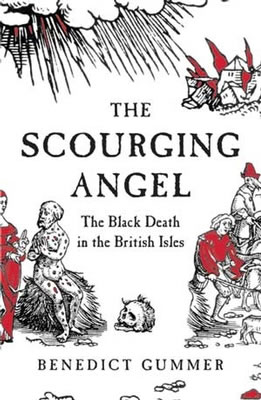 This is less a book of life and death than one of interminable convalescence: a swollen history in which the experience of the Great Plague subsides beneath the weight of falling revenues, rents, feudal dues, market sales, the destruction of capital, and rising inflation – it is really a Great divvying up of Property. A before, during, and after survey of the Black Death in the British Isles between 1346 and 1381, it begins with the first knockings of the Hundred Years War and the end of the Scots’ war of Independence, which coincided with the first European contracting the pestilence that crossed the continent and killed millions. In the Crimean port of Caffa the Mongolian khans were ejecting the Genoese when they began to drop dead. Their siege engines sent the rotting corpses over the city walls, and the Genoese, who couldn’t clear the bodies fast enough, began to die themselves or jumped port and sailed West taking the plague with them. The first wave of the pandemic reached British and Irish shores by mid-1348, and had disappeared within two years leaving half the population dead. The narrative ends in the mid-1380s when the youngest survivors had reached middle age and it became increasingly difficult to untangle the influence of this and succeeding plagues from other immediate matters – political crises, schism in the church, erratic weather, bounty and dearth.
This is less a book of life and death than one of interminable convalescence: a swollen history in which the experience of the Great Plague subsides beneath the weight of falling revenues, rents, feudal dues, market sales, the destruction of capital, and rising inflation – it is really a Great divvying up of Property. A before, during, and after survey of the Black Death in the British Isles between 1346 and 1381, it begins with the first knockings of the Hundred Years War and the end of the Scots’ war of Independence, which coincided with the first European contracting the pestilence that crossed the continent and killed millions. In the Crimean port of Caffa the Mongolian khans were ejecting the Genoese when they began to drop dead. Their siege engines sent the rotting corpses over the city walls, and the Genoese, who couldn’t clear the bodies fast enough, began to die themselves or jumped port and sailed West taking the plague with them. The first wave of the pandemic reached British and Irish shores by mid-1348, and had disappeared within two years leaving half the population dead. The narrative ends in the mid-1380s when the youngest survivors had reached middle age and it became increasingly difficult to untangle the influence of this and succeeding plagues from other immediate matters – political crises, schism in the church, erratic weather, bounty and dearth.
The conclusion is that the plague affected the pace of change but was not a “spring of action”, it did not change the way of life. With his tidy history, all coherence and symmetry (the fearful kind), Gummer brings a peculiar mundanity to a time of unthinkable misery. These people going about their business, great or small, were hit by a cataclysmic sideswipe of sickness that knocked all their quotidian concerns into a cocked hat, but we get a good dose of the medieval three field system before the first of “God’s tokens” appear.
Gummer preaches a gospel of hope and banality, a smoothing out of all the pain into the best of all possible worlds, as if the human condition is anathema. He avoids Eros and Thanatos, comedy and tragedy, where possible – less human experience, more “what will survive of us is taxation”. There is a frustrating absence of expansive humanity. Gummer is tone deaf to absurdity, and any hint of a human story is quickly suffocated by scholarly diligence. One wants to hear more of Matilda Wilcox who buried two husbands in six months, and of Emma Goscelin, the only one to turn up in court over a dispute with her husband Reginald after he and all her witnesses died of plague the day before.
But turn to the very end and read the poet Llywelyn Fychan, who lost five of his “gentle darlings” to plague. He is not, as Gummer imagines, whispering a quiet request of God but bellowing a raging demand for “payment for my family”. Like Ben Jonson’s “On My First Son”, Fychan’s words still have the power to walk across your grave:
“Woe is me, stuff of evil treachery, from the shilling under the armpit./ A bead which causes loud lamentation; accompaniment of agony, it would/ provoke an outcry, a lad with whom there’s no use pleading; a/ swelling under the armpit, grievous sore lump, white knob…/ punishment for an evil burden of sins./It caused grief and fury everywhere, shape of an apple full of pain,/ bitter head of an odious onion, a little boil which spares no one.”
There is a short appendix on epidemiology and how the rat didn’t do it, a recommendation of humility in case such a pandemic flares up today, a couple of obligatory pages on “women”, eight on treatments and healers, and a great deal on death and taxes being the only things we can ever be sure of. A truly inviting cover and title give way to a stolid press of academic history, and cannot disguise the splendid scholarship. Anyone hoping for a resonant Porteresque history of the Black Death is going to be surprised by the dead hand of taxes, property and politics.
The Scourging Angel is published by Bodley Head

